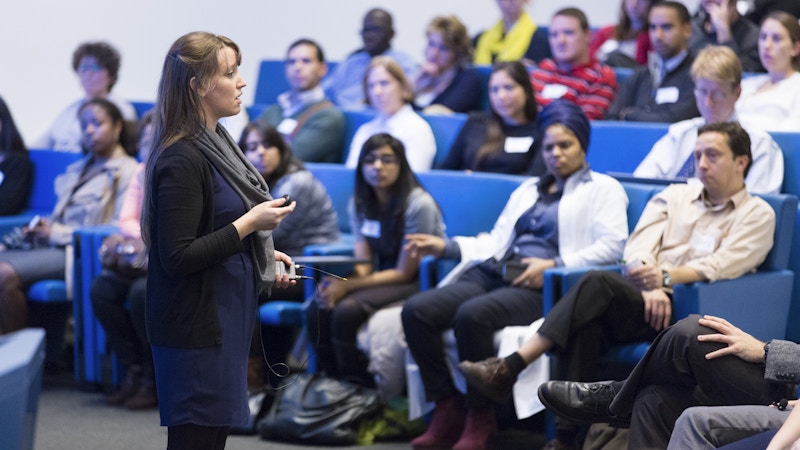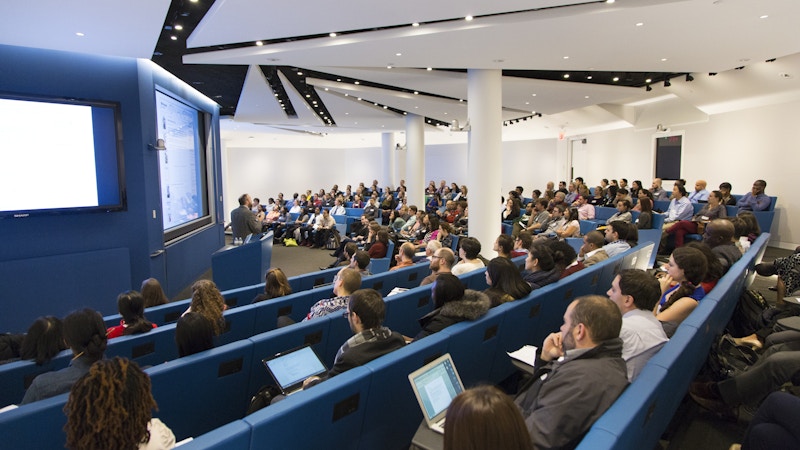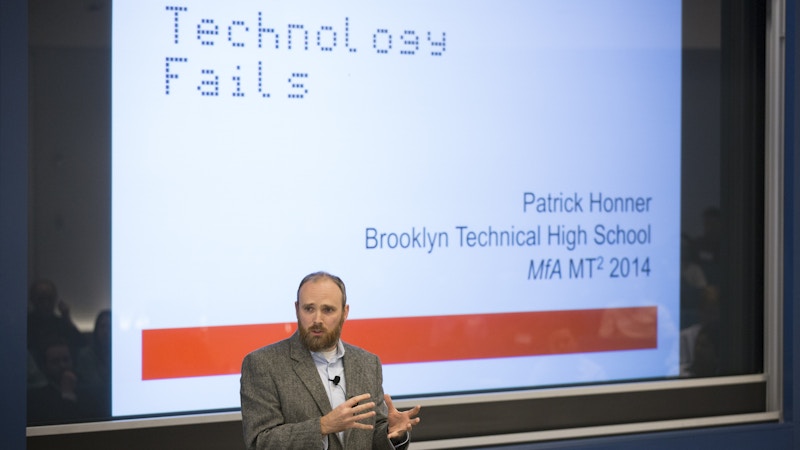MƒA Hosts Master Teachers on Teaching Event
“My presentation is about how I became a STEAM-y teacher,” explained Math for America (MƒA) Master Teacher Sarah Prendergast at this year’s MƒA Master Teachers on Teaching (MT2) event. MT2, held on December 4 at the Simons Foundation, celebrated teachers’ classroom accomplishments by giving them a platform to share their ideas on pedagogy with one another.
A total of 150 teachers attended this third annual MT2 event, during which speakers gave formal talks and the group had time to mingle and discuss teaching, innovative methods and new ideas.
Intended to promote MƒA’s mission of making science, technology, mathematics and engineering (STEM) teaching a viable, rewarding and respected career choice for the best minds in science and mathematics, the event featured original, thought-provoking presentations from MƒA teachers who are using novel techniques or who have a unique story to share with the community.
Prendergast, who teaches algebra and practices ‘maker’ education — which incorporates hands-on and real-world exercises — was an MƒA Fellow — a mathematically talented individual just starting her career — for five years. Three months ago she became a Master Teacher — one of a group of outstanding and experienced K through 12th grade science and math teachers at public schools in New York City.
Her presentation that evening, ‘How We All Can Be STEAM-y Teachers (paper engineering),’ was one of seven, each focused on this year’s theme: using technology to promote discovery in the classroom. Each presenter shared pedagogical advice, classroom experiences and fresh ideas for thinking about curricula with the rest of the Master Teacher community. Prendergast described several projects she assigned in her classroom, from using math to create paper bridges to finding the area and volume of models of animals.
“I throw in the ‘A’ for art, so I’m STEM plus art. These STEAM courses can enhance science and math education and get kids more curious about real science and real math through these interesting hands-on — and maybe even a little crafty — projects,” says Prendergast.
“These events keep it fresh and keeps up that love of math that we ought to have in the classrooms — so that kids get it from us,” says Zach Korzyk, an 11th grade algebra and trigonometry Master Teacher at Manhattan Village Academy, an MƒA community member for nine years.
Korzyk presented ‘Intuitive Transformations: Beyond the Rules,’ a talk that described his website, deltamath.com, which helps teachers create mathematics curricula and helps students understand mathematical concepts.
“I wanted to share the idea that there are things that can be more engaging for students and allow them to think about math in new, diverse ways,” says Korzyk.
Other presenters discussed information and communication technology, using technology to guide inferential thinking, what to do when technology fails, and other topics.
“These opportunities to talk to each other and pat each other on the back and be excited about what other people are doing and learn from them are priceless,” says Prendergast.
Not only did the event give teachers the opportunity to learn, it also worked to build and maintain the strong community created by MƒA. Meetings and conferences like these, along with mini courses taught by experts, professors and sometimes by Master Teachers, and Professional Learning Teams — collaborative and more informal groups of Master Teachers working toward a common goal — keep the MƒA community cohesive, supportive and stimulating.
Lavonne Hunter, a second-year Master Teacher who teaches 8th grade science at Baychester Middle School in the Bronx, presented at last year’s MT2 event. She says the meetings provide her with opportunities for personal growth outside of the classroom. “Being able to participate last year changed me, in that very moment,” she says. “I didn’t expect to be so personally impacted.”
“We’re all sharing ideas, and that’s what MT2 is about,” says Prendergast. “We should be always learning and constantly thinking about pedagogy.”





